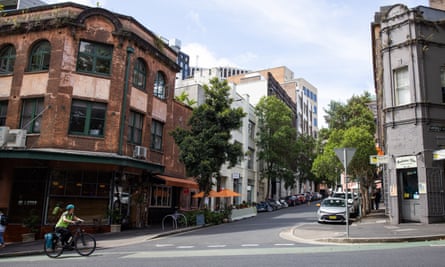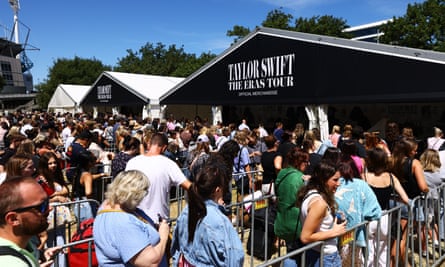Tim Brown, 44, and his wife, Marcella, 34, may not consider themselves bona fide “Swifties”, but when it was announced last June that Taylor Swift would be visiting their corner of the globe this summer they could not resist joining the scramble for a pair of tickets.
A post-pandemic appetite for live music events has fuelled huge worldwide interest in the American singer-songwriter’s Eras tour, which surpassed in $1bn sales in November to become the highest-grossing series of concerts in history.
The pop culture event of the summer will arrive in Europe next month, kicking off in Paris on 9 May and wrapping up in London on 20 August with 49 dates in between in Sweden, Ireland, Portugal, Germany, Poland, Austria, Spain, Italy, the Netherlands and Switzerland.
The unique nature of the tour’s ticketing system, which was tweaked after a number of hitches last year, means there will be a mass movement of travelling fans who will not only be Swiftie in affiliation but swift-like in their willingness to travel across the continent.
In expectation of intense demand, Ticketmaster introduced a pre-registration system that rewarded some early applicants with access codes to the ticket sale proper, via staggered windows for each city.
Notionally designed to prioritise genuine fans over “scalpers” – people who buy and resell tickets for a quick profit – the pre-sales system also meant many fans registered for tickets in multiple destinations across Europe to increase their chances.

Tim and Marcella, who live in Norwich, registered not just for the nearest concerts – in London and Liverpool – but also in Amsterdam and Lisbon. The pair got lucky with a pair of €91 tickets in the Portuguese capital and have turned the trip into a weekend break. “I used to live in Lisbon so I thought why not kill two birds with one stone,” Tim said. “We booked ourselves flights and four nights’ accommodation the same day.” They are far from alone.
Katie Soo, the chief business officer of DICE, a rival ticketing company, said: “The excitement and uncertainty inherent in the ticket-purchasing process might have inadvertently incentivised fans to apply for tickets in multiple cities, thereby increasing the likelihood of travelling across Europe to attend the concerts.”
Hotel prices
Several European cities have already reported a sharp rise in demand for hotel and short-term rental accommodation over the summer, when the Swift hurricane will arrive. In Edinburgh, Liverpool and Cardiff, rooms at the Travelodge chain around Swift’s June dates have been sold out since August 2023, a month after tickets for the shows went on sale.
In Paris, where fans anticipate Swift to debut an updated version of the Eras show with songs from the new Tortured Poets Department album, 80% of hotels and apartments listed on Booking.com are already full up. In Warsaw on 2 August, only 9% of hotels listed on the same site are still available.
Not all of the 18 cities covered by the Eras tour are obvious tourism destinations. From 17-19 July, Swift will play three concerts at the 65,000-capacity home ground of the football club Schalke 04 in Gelsenkirchen in Ruhr valley, western Germany. The city’s less-than-familiar name prompted one US chatshow host to quip that “the place might not even exist”.
Yet even in Germany’s rust belt the influx of Swift fans is temporarily transforming the hotel market: any two-bedroom apartments that remain available are going for €800-2,000 a night, with cheaper accommodation available only in surrounding cities that are just as off the usual tourist track as Gelsenkirchen, such as Essen, Bochum or Herne.
Cities with stricter rules on allowing Airbnb-style holiday lets and a more limited stock of short-term rental apartments are reporting a particularly marked increase in rates during Swift’s visit, with about 30% year-on-year spikes in rental rates in Cardiff, Edinburgh and Milan, according to AirDNA, a data analytics company specialising in the short-term rentals market.
Of all the tour’s European stops, Vienna is experiencing the most notable impact on its rental market, with booking rates for the nights of Swift’s concerts recorded in February 44% higher than at the same point the previous year. By the end of March the number of nights booked in the Austrian capital for the length of Swift’s stay in the second week of August had risen by 430% compared with the same period in 2023.
Tourism
When Luke Tilden’s wife, Tatjana, suggested last summer that the couple buy their 13- and 15-year-old daughters, Lena and Maya, tickets to a Taylor Swift gig for Christmas, the 53-year-old Briton initially waved it off. “There’s no chance in hell we’d get a ticket without paying through our noses, I thought,” said Tilden, who works as an interpreter at the European parliament in Brussels.
But after pre-registering for tickets in London, Paris and Munich, the Tildens got unexpectedly lucky for four tickets in southern Germany and have turned the concert visit into a mini-holiday: “We’ll visit the in-laws in Bavaria, enjoy the countryside, do a bit of hiking.”
The hope in cities across Europe is that this will be replicated on a massive scale, with fans’ excitement translating into generous spending sprees on food, shopping and leisure. In Stockholm, for example, where authorities are expecting 159,000 visitors to arrive from 135 countries in mid-May, the chamber of commerce has forecast a spending boost of €50m. “We hope the whole town will buzz from the Eras tour,” said Tomas Andersson, a spokesperson for the Swedish capital’s tourism board.
after newsletter promotion

Whether fans will necessarily act like ordinary tourists, however, is up for debate. “Pop-culture tourists do not necessarily care about traditional buildings and authentic restaurants,” said Maria Lexhagen, a professor at the European Tourism Research Institute, Mid Sweden University.
“Joining up with other fan communities is stronger motivation, as is the idea that they might get closer to the stars themselves. Many of them will map out where Swift is spending her time in the city – they will seek out seemingly marginal but meaningful places like back alleys or coffee shops.” Venues may be hoping for a repeat of Sydney in February, when Swift swept into an unassuming Italian restaurant in the suburbs and sent its name into global media headlines.

In Stockholm the tourism board said it was expecting bookshops and secondhand clothes stores, rather than museums and royal palaces, to attract most of the arriving visitors. Some venues are being proactive: one restaurant within walking distance of the multipurpose Friends Arena in the Solna municipality is putting on a “Taylor Swift brunch experience” with a karaoke stage; the waterfront nightclub Debaser is hosting a pre-concert party on 16 May, an all-ages all-day party with a Swift-themed quiz on 19 May and an afterparty the day after.
Environment
As the Swift circus rolls across the continent, the transport infrastructure of urban centres will also be put to the test. Around the tour’s three-night stop in Dublin at the end of June, Irish Rail has announced additional late-night services to Cork and Limerick to meet an expected increase in demand. Extra tram and bus services are likely to be announced nearer the time.
Unlike rail operators, most airlines do not have capacity to charter additional flights. Due to yield management – airlines adjusting prices based on expected demand – a scramble for airborne journeys into cities that host the Eras tour is more likely to result in more expensive tickets rather than additional flights.
Officials at Lisbon airport said no additional flights had been chartered around Swift’s concerts on 24 and 25 May but that demand would probably be reflected in slightly higher load factors. A spokesperson for Amsterdam Schiphol said general aviation slots could be requested at short notice but nothing out of the ordinary had been logged so far.
Calculating the environmental impact of the tour with any certainty was difficult, experts said. “We can expect that some Swift fans will travel a long way to see one, if not several, shows across Europe”, said Stefan Gössling, a professor of tourism at Linnaeus University in Kalmar, Sweden. “But measuring the environmental impact of these trips is extremely difficult – it would involve a lot of guesswork.”

This did not mean the carbon footprint was negligible. “Every flight taken by a person adds to demand and hence influences supply considerations,” Gössling said. “The greater the demand, the more aircrafts are in service.”
The pop star’s carbon footprint is easier to estimate. Swift owns two jets by the French manufacturer Dassault, whose journeys are trackable. During the 2023 leg of the Eras tour, Swift’s planes spent 166 hours crisscrossing the US in about 75 individual journeys, though it is possible they were used by people other than the singer.
According to data available through the open-access aviation tracker ADS-B exchange, Swift’s jets caused carbon emissions of about 2,830 tonnes of CO2 equivalent over the course of the US Eras tour – about 1,700 times the annual contribution of an average person.
A spokesperson for Swift told US media last year that in advance of the tour’s start in March 2023, the pop star bought more than double the carbon credits needed to offset all tour travel. Carbon offset credits are tradable certificates that allow purchasers to compensate for emissions by investing in environmental projects that claim to reduce carbon emissions, though recent studies have questioned the efficacy of these schemes.
Additional reporting by Ajit Niranjan
Source: theguardian.com


